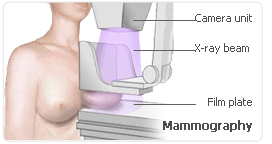
The 2006 study by Crandall et al.: “Association of New-Onset Breast Discomfort with an Increase in Mammographic Density during Hormone Therapy” evaluates the effects that hormone replacement therapy (HRT) has on breast-tissue density in postmenopausal women. Two HRT's used on women who are pre and postmenopausal are estrogen and progestin. These HRT's are known to increase breast tenderness. Crandall's study seeks to explore whether breast density is heralded by these symptoms of breast tenderness. This is an important topic to explore since breast-tissue density is an independent risk factor for breast cancer. In recent years, scientists have proposed a link between HRT and breast cancer, therefore studies such as this one are important.
The study evaluated thirty-three postmenopausal women who had taken HRT for an average of eleven months. Thirty-one postmenopausal women who had never taken HRT were monitored as a control group. Each group was examined with a periodic mammogram and then asked to rate their breast tenderness as being mild, moderate or severe. Reported increases in breast tenderness were associated with increases in breast-tissue density of women taking HRT. None of the women in the control group reported instances of breast tenderness.

Severe breast tenderness was most strongly associated with changes in breast-tissue density, while the links between mild breast tenderness and breast-tissue density were not as strong. Women receiving all types of HRT reported an increase in breast tenderness that corresponded with breast-tissue density. Some of the changes in breast tenderness and the corresponding breast-tissue density took place as early as four months into the HRT therapy. Of the twenty-one women taking HRT who did not suffer breast tenderness, only two were found to have increased breast-tissue density. The increased breast-tissue density in women taking HRT that was predicted by breast tenderness could take place primarily in one place, a few places or be diffused throughout the entire breast.
In conclusion, women should be wary and think twice before taking HRT. Those who do decide to take HRT or who are currently taking HRT should pay close attention to symptoms of breast tenderness since this study has shown that breast tenderness is a sign that breast-tissue is becoming denser. Previous, although limited studies have show that taking the endogenous sex steroids contained in HRT put one at a higher risk for breast cancer. For the women in the study who took HRT, what appeared to be breast density on a mammogram was really the stimulation in growth of the breast epithelial or stromal proliferation. However, besides HRT, breast-tissue density is also associated with age, body weight and menopausal status.